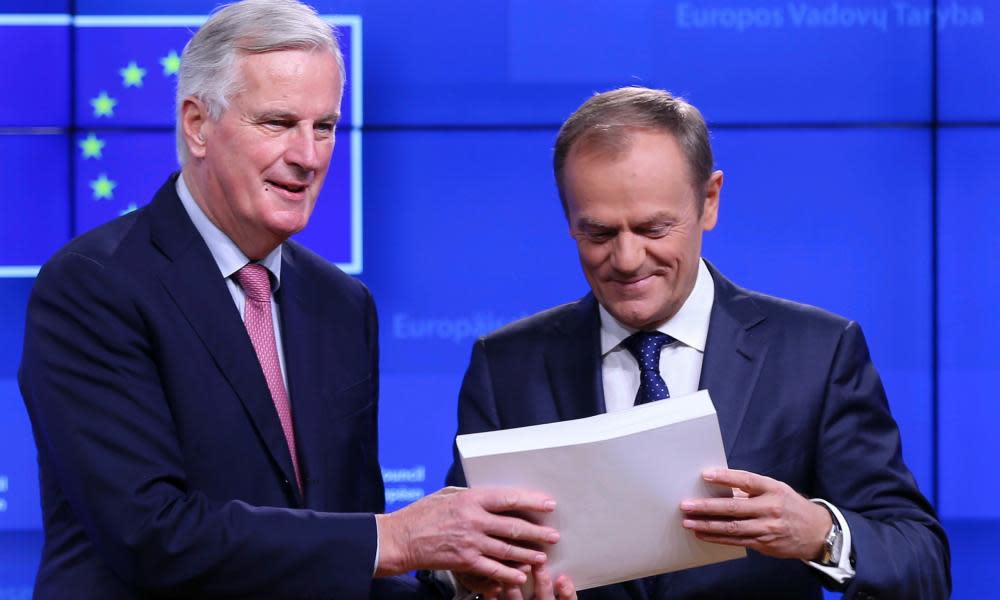Theresa May's Brexit deal is best we can do, Brussels warns

EU officials have warned those calling for Theresa May to go back to Brussels that the negotiators have “exhausted the margin of manoeuvre” in the talks and the draft deal is “the best we can do”.
As members of the cabinet and other ministers were handing in their resignation letters to the prime minister, the EU was trying to sell the deal to critics in London and member states who have expressed concerns.
One official said the negotiators had nowhere else to go, adding that the political masters on both sides should reflect on the impact of having more talks and what it would do to the process with so little time before the UK leaves the bloc.
“[As] negotiators, we are happy to stand over the agreement, and we think it is the best we can do collectively with the constraints that we have on both sides,” the official said.
Michel Barnier, the EU’s chief negotiator, was said by the head of the Greens in the European parliament, Philippe Lambert, to have told all the party leaders in Strasbourg on Thursday the deal was the best available given the UK’s demands and Brussels’ red-lines.
Beyond the chaos in Westminster, France, Spain, Denmark and the Netherlands are all understood to have serious concerns that a customs union has been handed to the UK without sufficient safeguards to ensure British companies cannot undercut European industry. They are likely to make their voices heard at a meeting of EU affairs ministers on Monday.
The EU official would not comment on whether Dominic Raab, who resigned as Brexit secretary on Thursday, had expressed his doubts about the outcome of the talks before this week.
The official said: “I am not going to speculate about a scenario where those who have the mandate are not happy with the outcome. We will see … Every party in a [negotiation] has to take their responsibility and we will have to see.”
Earlier in the day, the European parliament’s Brexit coordinator, Guy Verhofstadt, had told the BBC: “There is not a lot of room for manoeuvre to say, ‘OK, let’s start again’.”
The terms of the agreement as spelled out by the EU on Thursday are likely to heighten the political temperature in the UK.
The British government will not be able to leave the UK-wide customs union, included as a backstop to avoid a hard border on the island of Ireland, unless by common agreement with Brussels.
“There would be a possibility to terminate the application of the backstop, of the protocol, by common agreement,” the EU official said. “It has to be a joint decision.”
The customs union, and the level playing field demands, described as “fairly voluminous”, under which the UK would put EU directives into law and commit not to lower environmental, social and labour standards, were said to be the starting point and a basis for the future trade deal.
Under the terms of the backstop, which will come into force if a wider trade deal cannot do the job by the end of the 21-month transition period – even after a possible extension – the UK would also not be able to pursue its own free trade deals in goods.
The length of the transition extension, and the cost to the British taxpayer, is also yet to be negotiated – raising speculation that it could be longer than a year. Under the terms of the transition period, the UK will in effect stay in the EU but without any representation in its rule-making institutions.
“We still have some work to do and fill that out,” the official said, of the length of the transition, adding that this would be done by the proposed summit on 25 November.
On Thursday morning, Donald Tusk, the president of the European council, said he would gather leaders for a Brexit meeting “unless something extraordinary happens”.
When asked about the resignations in London, Tusk said: “It is not for me to comment on the latest developments in London ... the EU is prepared for a final deal with the United Kingdom. We are also prepared for a no-deal scenario – but of course we are best prepared for a no-Brexit scenario.”
Under the backstop, Northern Ireland would be in the same customs territory as the rest of the UK, but would also have to apply the full customs code and stay in the single market, unlike Great Britain, to ensure there are no border checks needed on the island of Ireland.
UK authorities, not EU officials, will be responsible for implementing and applying the backstop arrangements, which will include limited checks in British ports, factory and farm premises on both sides of the Irish Sea.
During a backstop arrangement EU representatives “shall have the right to be present, during and receive, upon request, all relevant information” relating to these checks, a second EU source said.

 Yahoo News
Yahoo News 
